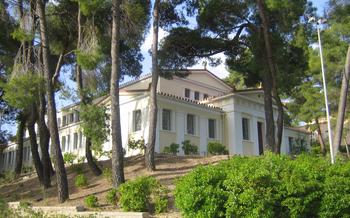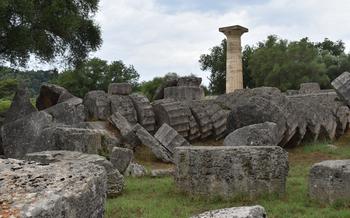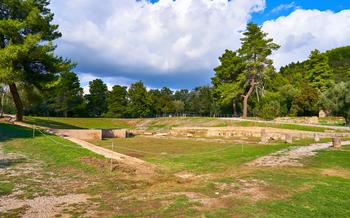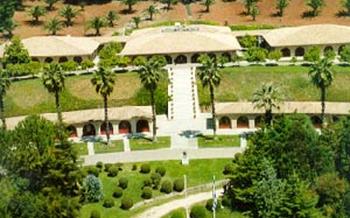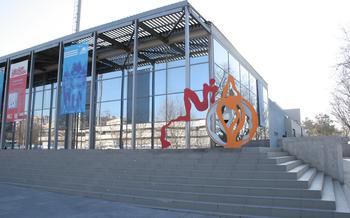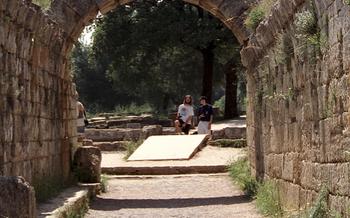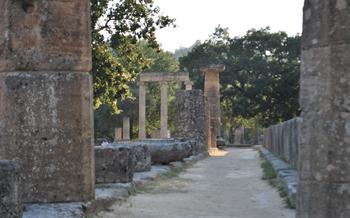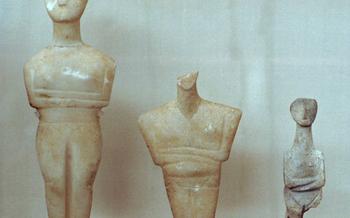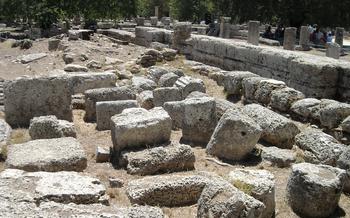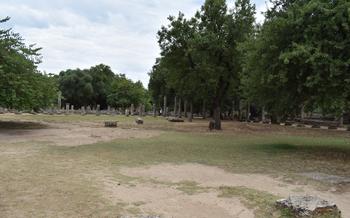
Thessaloniki Olympic Museum
- The Thessaloniki Olympic Museum: A Monument to Sports and History
- Exploring the Permanent Exhibition
- The Olympic Flame and the Torch Relay
- Interactive Exhibits and Activities
- The Olympic Museum Café and Shop
- Planning Your Visit
- The Thessaloniki Olympic Museum for Families
- The Museum's Educational Mission
- The Architecture of the Museum
- Thessaloniki's Olympic Legacy
- The Olympic Games in Ancient Greece
- The Modern Olympic Games
- The Role of Greece in the Modern Olympic Games
- Thessaloniki Olympic Museum: A Must-See for Sports Enthusiasts
- Insider Tip:
The Thessaloniki Olympic Museum: A Monument to Sports and History
The Thessaloniki Olympic Museum stands as a proud testament to the rich history of sports and the Olympic Games. Established in 2008, the museum is dedicated to preserving and showcasing the legacy of the Olympic movement, both ancient and modern. The museum's impressive collection of artifacts, interactive exhibits, and educational programs offers visitors a captivating journey through the world of sports and its profound impact on society and culture.
The museum's unique architectural design, inspired by the Olympic flame, is a symbol of the spirit of the Games. The building's dynamic curves and flowing lines evoke a sense of movement and energy, creating a striking landmark in the city of Thessaloniki. Inside, visitors are greeted by a spacious and modern exhibition space that houses a treasure trove of Olympic memorabilia, including torches, medals, uniforms, and equipment used by legendary athletes throughout history.
Exploring the Permanent Exhibition
The permanent exhibition at the Thessaloniki Olympic Museum takes visitors on a journey through the history of the Olympic Games, from their ancient origins to their modern-day resurgence. Visitors can learn about the evolution of sports and athleticism over the centuries, as well as the stories of legendary athletes and their achievements.
The exhibition also explores the impact of the Olympic Games on society and culture, showcasing how the Games have brought people together from all corners of the globe and inspired generations of athletes and fans alike. Interactive displays and multimedia presentations bring the history of the Olympics to life, allowing visitors to experience the excitement and grandeur of the Games firsthand.
Among the highlights of the permanent exhibition are:
- A replica of the ancient Olympic stadium in Olympia, Greece, where the first Olympic Games were held in 776 BC.
- A collection of ancient Greek artifacts related to the Olympics, including oil jars, discuses, and javelins.
- A timeline of the modern Olympic Games, from their revival in Athens in 1896 to the present day.
- Interactive exhibits that allow visitors to test their athletic abilities in a variety of sports, including running, jumping, and throwing.
- A theater that shows films and documentaries about the Olympic Games and the athletes who have competed in them.
The permanent exhibition at the Thessaloniki Olympic Museum is a must-see for anyone interested in the history, culture, and legacy of the Olympic Games. It is a place where visitors can learn about the values of excellence, friendship, and respect that are at the heart of the Olympic movement, and be inspired by the stories of the athletes who have competed in the Games.
The Olympic Flame and the Torch Relay
The Olympic flame is a symbol of unity, peace, and the Olympic spirit. It is lit in Olympia, Greece, at the site of the ancient Olympic Games, and then carried by torchbearers in a relay around the world to the host city of the current Olympic Games. The torch relay is a tradition that dates back to the ancient Olympic Games, when a flame was kept burning throughout the Games as a symbol of Zeus's protection.
The torch relay is a symbol of the journey that the Olympic Games have taken from their ancient origins to the present day. It is also a symbol of the unity of the world's athletes and the Olympic spirit of friendship and competition. The torch relay is a reminder that the Olympic Games are more than just a sporting event; they are a celebration of human achievement and the power of sport to bring people together.
Greece plays a special role in the Olympic flame tradition. As the birthplace of the Olympic Games, Greece is the starting point for the torch relay. The flame is lit in Olympia and then carried by torchbearers through Greece before being passed on to the host country. This tradition symbolizes the continuity of the Olympic Games and the importance of Greece's role in the Olympic movement.
Interactive Exhibits and Activities
The Thessaloniki Olympic Museum is not just a place to learn about the history of the Olympic Games; it's also a place to experience the thrill of sports firsthand. Visitors can immerse themselves in the Olympic spirit through a variety of interactive exhibits and activities.
Virtual Reality Experiences:
Transport yourself back in time and witness the grandeur of past Olympic Games through virtual reality experiences. Put on a VR headset and find yourself standing on the starting line of a 100-meter sprint, or soar through the air like a gymnast performing a gravity-defying routine. These immersive experiences bring the Olympic Games to life like never before.
Interactive Games and Challenges:
Test your athletic abilities and compete against friends and family in interactive games and challenges. From virtual archery to simulated cycling, there's something for everyone to enjoy. Put your reflexes to the test in a reaction time challenge, or see how far you can throw a virtual javelin. These interactive experiences make learning about sports fun and engaging.
Educational Exhibits:
The museum also features educational exhibits that delve into the science and history of sports. Learn about the physics of a golf swing, the anatomy of a runner's body, or the evolution of sports equipment over time. These exhibits provide a deeper understanding of the science behind athleticism and the history of the sports we love.
Workshops and Demonstrations:
Throughout the year, the museum offers workshops and demonstrations led by experts in various sports. Learn from professional athletes, coaches, and trainers as they share their knowledge and skills. Participate in a yoga workshop, try your hand at fencing, or learn the basics of basketball from a former Olympian. These workshops and demonstrations provide a unique opportunity to learn from the best and improve your own athletic abilities.
The Olympic Museum Café and Shop
After immersing yourself in the history and excitement of the Olympic Games, take a break and refuel at the Olympic Museum Café. Overlooking the museum's exhibits, the café offers a menu of refreshments and snacks to satisfy your cravings. Sip on a refreshing cup of coffee or tea as you admire the Olympic memorabilia on display. Indulge in a light lunch or a sweet treat to keep your energy levels up for further exploration.
In addition to the café, the museum also houses a well-stocked shop where you can purchase a variety of Olympic souvenirs and memorabilia. From official Olympic merchandise to sports equipment and apparel, you're sure to find something to commemorate your visit or to add to your collection. Take home a piece of Olympic history and relive the thrill of the Games whenever you wear or display your Olympic gear. Whether you're a sports enthusiast, a history buff, or simply looking for a unique and educational experience, the Thessaloniki Olympic Museum is a must-visit destination. With its interactive exhibits, educational programs, and the opportunity to purchase Olympic souvenirs, the museum offers a comprehensive and engaging exploration of the Olympic Games and their impact on sports, culture, and society.
Planning Your Visit
The Thessaloniki Olympic Museum welcomes visitors of all ages and backgrounds, offering a range of options to enhance your visit.
The museum is open to the public from Tuesday to Sunday, with slightly varied hours depending on the season. Admission fees are reasonable, making it accessible to both locals and tourists.
Guided tours are available for groups of all sizes, providing a deeper Einblick into the history and significance of the Olympic Games. Educational programs are also offered for schools and youth groups, tailored to different age levels and interests.
The museum is fully accessible to visitors with disabilities, featuring ramps, elevators, and accessible restrooms. To make the most of your visit, plan to spend at least two hours exploring the exhibits and interactive displays.
Remember to bring comfortable shoes, as there is a fair amount of walking involved. Photography is permitted, but flash photography and tripods are not allowed. Lockers are available for storing your belongings while you explore the museum.
Insider Tip: Plan your visit to coincide with one of the museum's special events or workshops. These events often include guest speakers, interactive activities, and unique opportunities to learn more about the Olympic Games and the history of sports.
The Thessaloniki Olympic Museum for Families
The Thessaloniki Olympic Museum is a great place for families to visit. There are many interactive exhibits and activities designed for children of all ages. Highlights include a virtual reality experience that transports visitors to past Olympic Games, and interactive games and challenges that test visitors' athletic abilities. The museum also offers family-friendly guided tours and educational programs.
The museum is a safe and welcoming environment for families to learn and explore together. There are plenty of places to sit down and rest, and there are also many opportunities for children to run and play. The museum also has a café where families can enjoy a snack or a drink.
Special events and workshops for families are held throughout the year. These events are a great way for families to learn more about the Olympic Games and to get involved in sports.
Here are some tips for visiting the Thessaloniki Olympic Museum with your family:
- Check the museum's website for information on upcoming events and workshops.
- Purchase tickets online in advance to avoid waiting in line.
- Arrive early to avoid crowds, especially during the summer months.
- Take advantage of the museum's free guided tours, which are offered in several languages.
- Let your children explore the museum at their own pace. There is no need to rush.
- Take breaks when needed. There are plenty of places to sit down and rest.
- Enjoy the museum's café, which offers a variety of snacks and drinks.
- Make a day of it. There is so much to see and do at the museum, you could easily spend several hours there.
The Museum's Educational Mission
The Thessaloniki Olympic Museum is not just a repository of Olympic memorabilia; it is also a vibrant educational institution dedicated to promoting the Olympic values of excellence, friendship, and respect. The museum offers a wide range of educational programs for schools and youth groups, designed to inspire and engage students of all ages. Through interactive exhibits, hands-on activities, and guided tours, the museum brings the Olympic Games to life and teaches visitors about the history, culture, and significance of this global sporting event.
The museum's educational mission extends beyond its walls, with outreach initiatives that engage the local community and visitors from around the world. The museum collaborates with schools, sports organizations, and cultural institutions to offer workshops, seminars, and events that promote the Olympic values and encourage participation in sports. The museum also hosts special exhibitions, lectures, and film screenings that explore the history and impact of the Olympic Games from different perspectives.
The Thessaloniki Olympic Museum is committed to lifelong learning and sports education. It serves as a valuable resource for students, researchers, and anyone interested in the Olympic movement. The museum's extensive collection of books, periodicals, and audiovisual materials is available to the public, and the museum staff is always on hand to answer questions and provide guidance.
The Architecture of the Museum
The Thessaloniki Olympic Museum is housed in a striking and contemporary building that reflects the spirit of the Olympic Games. Designed by renowned Greek architect Ioannis Vikelas, the museum's unique design symbolizes the dynamism and energy of sports. The building's facade is adorned with a series of colorful panels that represent the Olympic rings, while the interior features a spacious atrium that creates a sense of openness and grandeur.
The museum's use of sustainable materials and technologies showcases its commitment to environmental responsibility. The building is constructed with energy-efficient features and incorporates natural light to reduce its carbon footprint. The integration of art and architecture is evident throughout the museum, with sculptures, murals, and installations that celebrate the Olympic spirit.
As a landmark and cultural attraction in Thessaloniki, the museum's architecture serves as a testament to the city's rich sporting heritage and its role in the Olympic movement. The building's iconic design has become a symbol of Thessaloniki's commitment to sports and its status as a vibrant and cosmopolitan city.
Thessaloniki's Olympic Legacy
Thessaloniki's Olympic legacy is a testament to the city's deep-rooted connection to the Olympic movement. In 2004, Thessaloniki proudly hosted several events during the Summer Olympics, including preliminary football matches and the rhythmic and artistic gymnastics competitions. The city's modern and well-equipped sports facilities, such as the Thessaloniki Olympic Stadium and the PAOK Sports Arena, served as venues for these events, showcasing Thessaloniki's commitment to sporting excellence.
The Olympic Games left a lasting impact on Thessaloniki's infrastructure and economy. The construction of new sports facilities and the renovation of existing ones not only provided world-class venues for athletes but also contributed to the city's overall development. The influx of visitors and media during the Olympic Games also boosted Thessaloniki's economy, showcasing the city's potential as a major tourist destination.
Beyond the physical infrastructure, Thessaloniki's Olympic legacy extends to the city's continued commitment to sports and athleticism. The Olympic spirit of excellence, friendship, and respect has become deeply ingrained in Thessaloniki's sporting culture, inspiring young athletes to pursue their dreams and achieve their full potential. The city regularly hosts major sporting events, including international competitions and tournaments, further solidifying its position as a hub for sports in Greece and the region.
The Olympic Games in Ancient Greece
The history of the Olympic Games can be traced back to ancient Greece, where they were held in the city of Olympia every four years to honor Zeus, the king of the gods. The first recorded Olympic Games were held in 776 BC, and they continued to be held for over 1,000 years until they were banned by the Roman emperor Theodosius I in 393 AD.
The ancient Olympic Games were a religious and cultural festival that celebrated the physical and spiritual strength of the Greek people. The games included a variety of athletic competitions, such as running, jumping, wrestling, boxing, and chariot racing. The winners of the games were crowned with olive wreaths and given the title of "Olympic champion."
The ancient Olympic Games had a profound impact on Greek society and culture. They promoted the ideals of physical fitness, sportsmanship, and fair play. They also helped to foster a sense of unity and cooperation among the different Greek city-states.
The legacy of the ancient Olympic Games can still be seen today in the modern Olympic Games, which were revived in Athens in 189The modern Olympic Games are held every four years and feature athletes from all over the world competing in a variety of sports. The Olympic Games are a symbol of peace and unity, and they continue to inspire people around the world.
The Modern Olympic Games
The modern Olympic Games were revived in Athens in 1896, thanks to the efforts of French educator and historian Pierre de Coubertin. Inspired by the ancient Olympic Games, Coubertin envisioned a global sporting event that would promote international understanding and peace. The first modern Olympic Games featured 241 athletes from 14 countries competing in 43 events. Since then, the Olympic Games have grown exponentially, attracting thousands of athletes from over 200 countries who compete in dozens of sports.
The growth and evolution of the modern Olympic Games have been marked by both triumphs and challenges. The Olympic movement has faced criticism for its commercialization, political controversies, and doping scandals. Despite these challenges, the Olympic Games remain a powerful symbol of global unity and athletic excellence.
The future of the Olympic Games is uncertain, as the movement faces new challenges such as the rising costs of hosting the Games, the impact of climate change, and the increasing popularity of professional sports. However, the Olympic Games continue to hold a special place in the hearts of athletes and fans around the world. The Olympic spirit of competition, camaraderie, and sportsmanship is a powerful force for good in the world.
The Role of Greece in the Modern Olympic Games
Greece holds a unique and pivotal position in the history and tradition of the modern Olympic Games. As the birthplace of the ancient Olympic Games, Greece is deeply intertwined with the origins and essence of the Olympic movement. The revival of the Olympic Games in Athens in 1896 marked a significant moment in the history of sports, and Greece has played a crucial role in shaping the modern Olympic movement ever since.
Greek athletes have made significant contributions to the Olympic movement, showcasing their athletic prowess and determination on the global stage. Numerous Greek athletes have won Olympic medals, bringing honor to their country and inspiring future generations of athletes. Greece has also hosted the Olympic Games on multiple occasions, including the inaugural modern Olympic Games in 1896 and the 2004 Summer Olympics in Athens. These events showcased Greece's commitment to the Olympic ideals and its ability to organize and host world-class sporting events.
Beyond its hosting and athletic achievements, Greece continues to play an active role in promoting the Olympic values and principles. The country is home to several Olympic academies and training centers, which provide support and resources to athletes from around the world. Greece also collaborates with international organizations to promote the Olympic spirit and encourage participation in sports at all levels.
Greece's contributions to the modern Olympic Games are a testament to its enduring legacy as the birthplace of the Olympics. The country's passion for sports, its commitment to the Olympic ideals, and its ongoing support for the Olympic movement ensure that Greece remains an integral part of the global Olympic family.
Thessaloniki Olympic Museum: A Must-See for Sports Enthusiasts
The Thessaloniki Olympic Museum is a must-see destination for any sports enthusiast or anyone interested in the history and culture of the Olympic Games. With its unique collection of Olympic artifacts and memorabilia, immersive and interactive exhibits, and educational programs and initiatives, the museum offers a truly unforgettable experience. Visitors can explore the history of the Olympic Games from ancient times to the present, learn about the evolution of sports and athleticism over the centuries, and discover the stories of legendary athletes and their achievements. Through interactive exhibits and activities, visitors can experience the thrill of the Olympic Games firsthand, testing their own athletic abilities and learning about the science and history of sports. The museum also features a café and shop, offering refreshments, souvenirs, and sports equipment, making it the perfect place to relax and shop after a day of exploration. Whether you're a lifelong sports fan or simply looking for a fun and educational experience, the Thessaloniki Olympic Museum is sure to leave a lasting impression.
Insider Tip:
To fully appreciate the Thessaloniki Olympic Museum's treasures, plan your visit during the off-season, typically from November to March. This strategic timing offers several advantages. First, you'll encounter fewer crowds, allowing you to leisurely explore the exhibits without feeling rushed. The serene atmosphere provides an opportunity for deeper engagement with the museum's artifacts and stories. Second, you'll likely receive more personalized attention from the museum staff, who can provide insightful details and answer your questions in depth. Additionally, off-season visits often come with special promotions or discounts, making it a budget-friendly option. Embrace the tranquility of the off-season to immerse yourself in the Olympic spirit and make your museum experience truly memorable.
